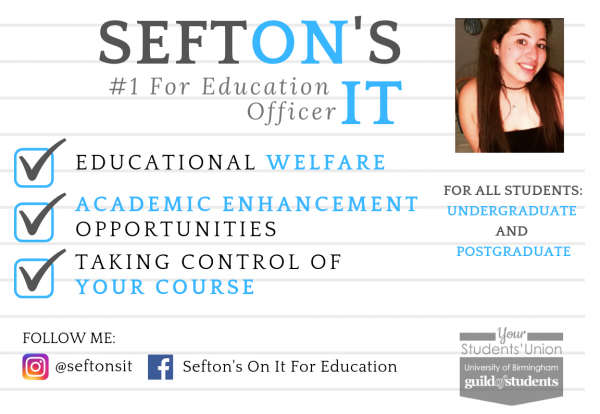
News Reporter Aneesa Ahmed spoke to this year’s Education Officer candidates ahead of their campaigns going live to find out about their policies
The role of the Education Officer (EO) is to oversee the academic experiences of students, which includes overseeing the services provided by the library and the student rep system.
Only one candidate, Amanda Sefton, agreed to have an interview published with Redbrick. The two other candidates running are listed in alphabetical order by surname at the bottom of the page.
Voting for Guild Elections opens at 10 AM on Monday 25th February and closes at 4 PM on Friday 1st March, with the results announced on Saturday 2nd March. Vote HERE.
Amanda Sefton

Amanda Sefton, a fourth-year Political Science Student, is running for the role of EO as she wants to ensure the best academic experience for all students, both undergraduate and postgraduate.
She believes that students should gain as much as possible academically from their time at UoB as, ultimately, ‘students come to the University to obtain a degree.’ Sefton wants to ensure that everyone is having ‘the full academic experience that they paid for.’
During her time at the University, Sefton has been involved with student societies and activities, and has had friends who have run for positions in the Guild. After seeing the difference that they managed to make by using the Guild as a positive platform, Sefton felt inspired to make a difference herself. This was her motivation to run for EO this year.
She was also president of a youth group while growing up and said that her leadership experience was another factor that inspired her to run for EO, as it would equip her well for the responsibility of the role.
She believes that an increased emphasis on work experience can enhance a student’s overall university experience
There are three main components in Sefton’s manifesto: educational welfare; academic enhancement opportunities and taking control of your course. She emphasised how realistic her manifesto policies are, as none of them require much funding and can all be achieved through ‘basic communication.’
Sefton believes that it is the smaller-scale, student-focused issues that should be tackled first and foremost. She also expressed interest in continuing some of current EO Adam Goldstone’s policies, such as the Asylum Seeker Scholarship and improving study spaces.
The first of Sefton’s three key manifesto points is educational welfare, where she aims to ‘create a code of practice on how to deal with extensions and lateness by college, not by department.’ She believes that there are inconsistencies between subjects when it comes to lateness and extensions and believes that issues regarding deadlines and extensions should all be considered on a case-by-case basis.
The second is academic enhancement opportunities, where Sefton wants the University to start placing more importance on the option of a year in industry and work experience opportunities. Sefton wants to utilise the University’s extensive alumni network, as that will be beneficial to both current and former students.
She believes that an increased emphasis on work experience can enhance a student’s overall university experience as they can learn skills and gain experiences which could benefit them after graduation.
Sefton’s last main policy is ‘taking control of your course.’ She proposes increasing the visibility of student reps and having clearer communications between student reps and the students on each course.
She proposes termly rep forums where students can directly address issues with their student reps and thus develop clearer communication with them. Sefton would also introduce an online ‘find your rep’ system.
Muhammad Abd-us-samad is another candidate running to be next year’s Education Officer, but he asked Redbrick to not publish his interview. His manifesto poster can be seen below. Jodie Brown is also running but did not accept her offer to be interviewed. She did not send Redbrick a visual manifesto.


Comments